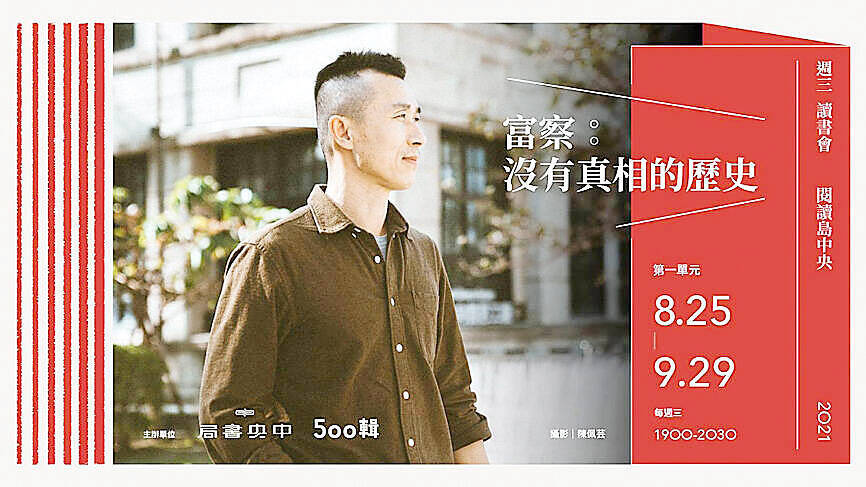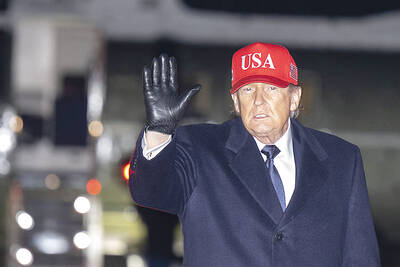The family of Gusa Press (八旗文化) editor-in-chief Li Yanhe (李延賀), who has been detained in China since 2023, was warned by Chinese officials not to make details about Li’s case public, a source said on Sunday.
Li, better known by his pen name, Fucha (富察), was born in China’s Liaoning Province and obtained Taiwanese citizenship after living in Taiwan for many years. He returned to Shanghai in March 2023 to cancel his household registration, but was arrested by police for allegedly “endangering national security,” and has since been detained in an unknown location.
China’s Taiwan Affairs Office (TAO) on Tuesday last week said in a statement that Li was last month convicted of “inciting secession” in China, prompting complaints from Taiwanese authorities that the trial had been held in secret.

Photo: Screen grab from Facebook
A Shanghai court convicted Li on Feb. 17 in a “public sentencing,” the TAO said, without specifying the sentence.
A source on Sunday said the Chinese Communist Party (CCP) explicitly warned Li’s family not to disclose the length of his sentence. They were allegedly told that if they leaked any details, Li would receive a heavier sentence and could potentially be “eliminated.”
In a bid to secure Li’s release, his family has maintained a low profile, avoiding public appeals and limiting how much information they share with the Taiwanese government.
China’s failure to efficiently try and sentence Taiwanese “dissidents,” and leaving their cases hanging is a form of intimidation toward Taiwanese, Soong Kuo-cheng (宋國誠), a researcher on Taiwan-China affairs at National Chengchi University’s Institute of International Relations, said on March 16.
China wants the progress of the Fucha case to remain ambiguous, as that would psychologically intimidate Taiwanese, he added.
By not disclosing his sentence, Beijing aims to instill fear — sending a message that publishing books critical of the Chinese government could lead to arrest and imprisonment, he said.
Lam Wing-kee (林榮基), the former owner of Hong Kong’s Causeway Bay Books who was previously detained by the CCP before later relocating to Taiwan, said that China frequently employs such tactics.
He cited the example of Yiu Man-tin (姚文田), the 73-year-old former owner of Hong Kong’s Morning Bell Press, who in 2014 was sentenced to 10 years in prison on smuggling charges.
Yiu’s arrest was widely believed to be a response to his publication of a book critical of Chinese President Xi Jinping (習近平). At the time, Yiu’s wife had planned to campaign in Hong Kong for his release, but was secretly threatened by the CCP to stay silent.
Lam speculated that, based on past cases, Li’s sentence is unlikely to be shorter than eight or nine years, citing the case of Taiwanese activist Yang Chih-yuan (楊智淵), who last year was sentenced to nine years in prison for the crime of “secession.”
Yang is the cofounder of the pro-Taiwan independence Taiwanese National Party.
Lam expressed concern that even after Li’s release, he might not be able to leave China, because he was born there and holds Chinese citizenship.
Taiwanese human rights activist Lee Ming-che (李明哲) said that if China were to release Li’s official sentencing documents, they would only prove that Li was legally publishing books in Taiwan, exposing China’s suppression of free speech.
The CCP thus prefers keeping the details of Li’s case secret, while branding him a “separatist” for domestic propaganda purposes, he said.
Lee was imprisoned for five years in China for allegedly subverting state power. He was released in 2022.
Additional reporting by Reuters

Taiwan has received more than US$70 million in royalties as of the end of last year from developing the F-16V jet as countries worldwide purchase or upgrade to this popular model, government and military officials said on Saturday. Taiwan funded the development of the F-16V jet and ended up the sole investor as other countries withdrew from the program. Now the F-16V is increasingly popular and countries must pay Taiwan a percentage in royalties when they purchase new F-16V aircraft or upgrade older F-16 models. The next five years are expected to be the peak for these royalties, with Taiwan potentially earning

STAY IN YOUR LANE: As the US and Israel attack Iran, the ministry has warned China not to overstep by including Taiwanese citizens in its evacuation orders The Ministry of Foreign Affairs (MOFA) yesterday rebuked a statement by China’s embassy in Israel that it would evacuate Taiwanese holders of Chinese travel documents from Israel amid the latter’s escalating conflict with Iran. Tensions have risen across the Middle East in the wake of US and Israeli airstrikes on Iran beginning Saturday. China subsequently issued an evacuation notice for its citizens. In a news release, the Chinese embassy in Israel said holders of “Taiwan compatriot permits (台胞證)” issued to Taiwanese nationals by Chinese authorities for travel to China — could register for evacuation to Egypt. In Taipei, the ministry yesterday said Taiwan

‘LIKE-MINDED PARTNER’: Tako van Popta said it would be inappropriate to delay signing the deal with Taiwan because of China, adding he would promote the issue Canadian senators have stressed Taiwan’s importance for international trade and expressed enthusiasm for ensuring the Taiwan-Canada trade cooperation framework agreement is implemented this year. Representative to Canada Harry Tseng (曾厚仁) in an interview with the Central News Agency (CNA) said he was increasingly uneasy about Ottawa’s delays in signing the agreement, especially as Ottawa has warmed toward Beijing. There are “no negotiations left. Not only [is it] initialed, we have three versions of the text ready: English, French and Mandarin,” Tseng said. “That tells you how close we are to the final signature.” Tseng said that he hoped Canadian Prime Minister Mark Carney

The US’ joint strikes with Israel on Iran dismantled a key pillar of China’s regional strategy, removing an important piece in Beijing’s potential Taiwan Strait scenario, said Zineb Riboua, a senior researcher at the Hudson Institute’s Center for Middle East Peace and Security. In an article titled: “The Iran Question Is All About China,” Riboua said that understanding the Iran issue in the context of China’s “grand strategy” is essential to fully grasp the complexity of the situation. Beijing has spent billions of dollars over the years turning Iran into a “structural strategic asset,” diverting US military resources in the